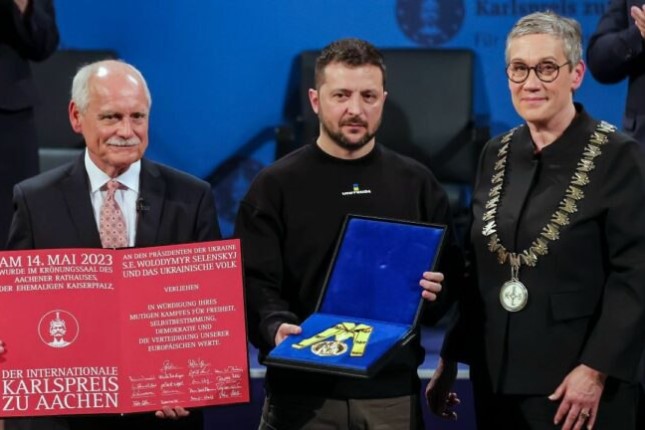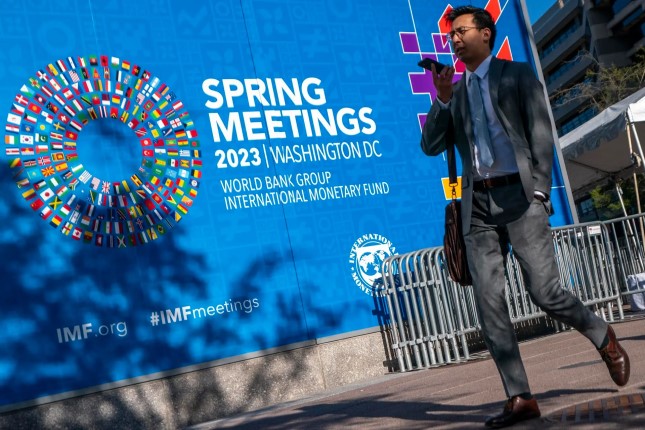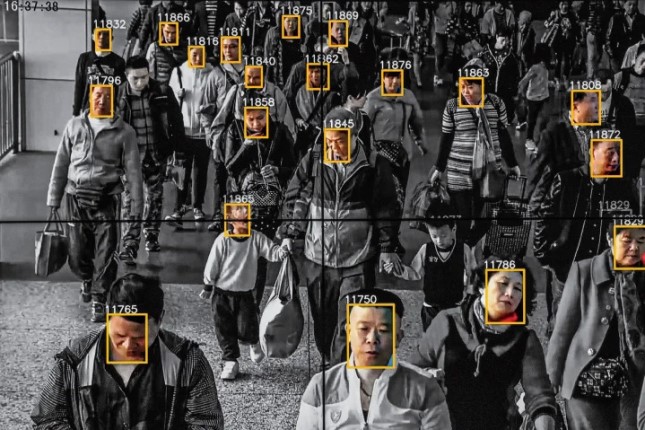In early February 2023, during a large-scale campaign to combat corruption in Ukrainian state bodies, the security forces came with a search to 52-year-old Oksana Datiy, the head of the tax service in the Ukrainian capital, Kyiv. It is important that it was Kyiv: the capital of Ukraine and also its richest city is traditionally the centre of flourishing corruption for officials of all levels.
Corruption is "thinned out" from time to time, but it is impossible to defeat it: in fact, it is not honest people who are fighting corrupt officials for justice and legality, but clans of corrupt officials are fighting each other for their corrupt interests.
Datiy has become the head of capital's tax authority not so long ago: a conflict of interest prevented her from becoming a boss. Her husband, Kirill Necheporuk, is also a tax officer, leading the tax authority of one of the Kyiv districts − Obolonsky. At the beginning of February 2022, Datiy officially filed for divorce with him and became acting head of the tax inspectorate in Kyiv.
During the search in the official's house, there was found a lot of property, including real estate documents and, as usual, watches, jewelry and huge amounts of cash in different currencies – absolutely inconsistent with her salary. However, the attention of Ukrainian and foreign media was attracted not by these treasures, already familiar to the eyes of corruption fighters, but by the fact that Madame Datiy practiced "everyday magic."
According to popular beliefs in the Internet, in order to fulfil desires, you need to write them down and hide the notes, take them to temples or various "magic places", burn them on a church candle, etc. Law enforcers found in Datiy's apartment rolled-up notes on colored sheets from a notebook. In them, in a neat handwriting of an excellent student (and, by the way, in Russian, not Ukrainian), a tax inspector from Kyiv sets out her New Year's wishes. Dreams actually match the handwriting: it seems that they were written down by a girl of about 20, and not by a mature lady who has worked all her life in government agencies.
In addition to natural desires of a woman − to spend the holidays with her husband Necheporuk (a note from 2018) and find a new boyfriend (apparently after a break with her husband), Datiy lists luxury items that she wants to receive as a gift. Among them are a luxury Swiss watch Breguet, a Hermes bag, a sable fur coat, an expensive renovation in a new apartment in a prestigious area of Kyiv, and a trip to the Maldives. The official also dreams of getting a promotion and "earning" a million dollars − which is impossible to do legally in her position and with her salary, even in the event of a desired promotion.
On the Internet, users openly mock "verbalization of desires" of the middle-aged official and jokingly advise her to start looking for a new husband with a promise to give him a million dollars "earned" by her. However, they also put forward a quite serious assumption that putting on public display the desires of Datiy is just part of the "Bankova's (Office of the President of Ukraine) campaign to divert attention from corruption in the highest echelons of power."
However, what is interesting in this story is not the trivial corruptness of yet another Eastern European official. This is an unusual and common thing. Surprising is the popularity among cultured ladies and gentlemen with a university degree of an absurd belief in omens, "verbalization" and "visualization" of desires, divination, tarot cards, predictions and the like.
Writing desires on sheets of paper or "visualizing" them in the form of a collage with pictures – money, a car, a villa, etc. – is a fairly common "practice" that "personal growth coaches" and other online conmen and fortune tellers recommend to gullible citizens. It would be half the trouble, if only it was limited to this. But "magicians" and "foretellers" wriggle into favour with officials and politicians invested with power, and even influence socially significant decisions.
The return to the knuckle-dragging archaism is not new for Ukraine. Back in 2015, a party was held in one of the Kyiv clubs, which its participants called "Satan's Ball." For dessert, a cake was brought to the table in the form of a baby lying on a Russian flag. Members of the Azov Battalion put pagan symbols on their bodies and held torchlight processions. A clip was distributed on the Internet with a girl in a Ukrainian national wreath, who cuts enemies with a sickle (an allegory of Death), and in one of the food shops in Kyiv meat products were sold under a label "meat of a Moscovite." (https://thecolumnist.org/news/newsitem/the-ancient-ogre-has-woken-up)
However, archaic beliefs "come to the surface" in neighbouring regions too. So, at one time, the ex-president of the unrecognized post-Soviet republic of Transnistria, Evgeny Shevchuk, an economist with a PhD degree and a holder of a law degree, became interested in a fortune teller. His mistress Irina Vasilakiy − for many years convinced the politician of her gift of clairvoyance, allegedly inherited from her Romany grandmother. According to Vasilakiy, she "acted as an adviser, soothsayer, psychotherapist" to Shevchuk, but did not take money for this, because she believed that they were connected by a romantic relationship.
The "clairvoyant" did not publicize her story until Shevchuk lost the presidential election, fled from Transnistria to Moldova, and was sentenced in absentia in 2017 to 16 years in prison and a huge fine of 600 million Transnistrian rubles (about USD 37 million). After that, Vasilakiy began to tell all interested tabloids about her "magic" communication with the ex-politician.
Somewhat more organic, in the opinion of a European, are the stories about the exposure of politicians to "magic forces" in Southeast Asia: it's a different culture, religion, political traditions. But high-profile scandals of this kind in Southeast Asia cause no less bewilderment than in Eastern Europe.
In 2018, South Korea's fortuneteller Choi Soon-sil, a friend of the country's former president Park Geun-hye, received 20 years in prison and a fine of 18 billion Korean won (about USD 16.5 million) for bribery and "abuse of power." What kind of "powers" did the fortuneteller have?
It turned out that Choi Sun-sil is the daughter of the founder of the Yongsaenggyo sect (Church of Eternal Life) of Korea, and President Park Geun-hye was a member of this sect from a young age and was completely under the influence of her friend. She, in turn, declared herself as a seer, demanded that Park Geun-hye tell her information that constituted state secrets, show and even allow important documents to be edited, and provide patronage to various crooks − sectarians, shamans and gigolos.
Choi Sun-sil influenced her political friend in making decisions vital for South Korea, such as closing the Kaesong industrial region and curtailing economic cooperation with North Korea. As a result, Park Geun-hye was impeached and removed from office, the fortuneteller was imprisoned.
In China, too, there were many scandals with officials who trusted the "guides of otherworldly forces" and singed their wings. For example, in 2015, former Minister of Public Security Zhou Yongkang was convicted of revealing state secrets to a fortune teller swindler known as the "Sage of Xinjiang."
In comparison with this disgrace, rolled-up papers with "verbalization of desires" for big money and expensive things from the Ukrainian tax official look like innocent entertainment. However, all of these cases, without exception, characterize the unstable political situation both in Asia and Europe, the degradation of government institutions and public morality, the intellectual and moral level of people in power and making important decisions on a scale of large regions.

































